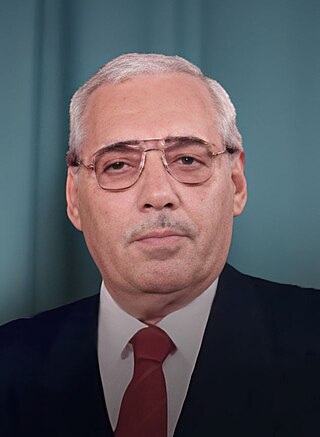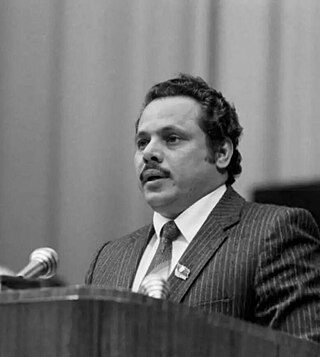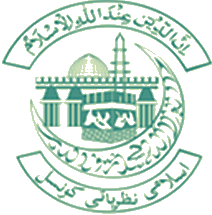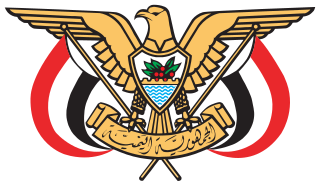Sources
- The Europa World Year Book 1970, Volume II, p. 1353
| Agency overview | |
|---|---|
| Formed | 23 June 1969 |
| Dissolved | 27 December 1978 |
| Superseding agency | |
| Jurisdiction | People's Democratic Republic of Yemen |
| Headquarters | Aden |
The Presidential Council was the permanent body of the Supreme People's Council that ruled South Yemen from June 23, 1969 to December 27, 1978. Its chairman was the head of state.
| Name | Entered Office | Left Office |
|---|---|---|
| Salim Rubai Ali | 23 June 1969 | 26 June 1978 |
| Ali Nasser Muhammad | 26 June 1978 | 27 December 1978 |

Ali Kafi was an Algerian politician who was Chairman of the High Council of State and acting President from 1992 to 1994.

Ali Nasir Muhammad Al-Husani is the former leader of South Yemen serving as General Secretary of the Yemeni Socialist Party between 1980 and 1986. He was twice president of South Yemen and once the Prime Minister. He served as the Prime Minister from 2 August 1971 until 14 February 1985 and as Chairman of the Presidential Council from 26 June 1978, after overthrowing and executing Salim Rubai Ali, until 27 December 1978.

The Association of Combatant Clerics is an Iranian reformist clerical political party. It is regarded as a left-wing party within the Iranian political spectrum.

Ayatollah Mohammad Reza Mahdavi Kani was an Iranian Shia cleric, writer and conservative and principlist politician who was Prime Minister of Iran from 2 September until 29 October 1981. Before that, he was Minister of Interior in the cabinets of Mohammad-Ali Rajai and Mohammad-Javad Bahonar. He was the leader of Combatant Clergy Association and Chairman of the Assembly of Experts and also founder and president of Imam Sadiq University.

The Consultative Assembly is the legislative body of the State of Qatar, with 45 members. Following the 2021 Qatari general election, it has 30 elected and 15 appointed members. The body can only question the prime minister, who is appointed by the Emir of Qatar, on his policies if two-thirds of the members agree, which is unlikely given that one-third of the members are appointed by the Emir.
Koral is a village and Union Council located in Islamabad Capital Territory, Pakistan.

Council of Islamic Ideology (CII; is a constitutional body of Pakistan, responsible for giving legal advice on Islamic issues to the government and the Parliament.

Fulgazi, also spelt Phulgazi, is an upazila of the Feni District, located in Bangladesh's Chittagong Division. It is best known as the home upazila of Khaleda Zia, a former Prime Minister of Bangladesh.

The Muhammad Ali dynasty or the Alawiyya dynasty was the ruling dynasty of Egypt and Sudan from the 19th to the mid-20th century. It is named after its progenitor, Muhammad Ali of Egypt, regarded as the founder of modern Egypt.
Kalinjar is one of the 44 union councils,, of Haripur District in the Khyber Pakhtunkhwa province of Pakistan. It is located to the north of the district capital Haripur and borders Mensehra and Abbottabad District area.

The Balochistan High Court is the highest judicial institution of Balochistan, Pakistan. The court is formally known as the High Court of Balochistan. It is situated in the provincial capital, Quetta.
Thikriwala 74 Jb is a village in Punjab, Pakistan. It is situated at the Jhang road, 22 km from Faisalabad city, in Tehsil Sadar.

The Vice President of the Republic of Yemen is the second highest political position in Yemen.

Muhammad Ali al-Halabi was a Syrian politician.
The Gilgit-Baltistan Council has been established as per Article 33 of Gilgit-Baltistan Order, 2009. Its Chairman is the Prime Minister of Pakistan and the Governor of Gilgit-Baltistan is the Vice-Chairman over the six members-elected. It can legislate on 53 subjects as provided in Schedule III of the Order.
Chowdhury is a title of honour, usually hereditary, originating from the Indian subcontinent. It is an adaption from Sanskrit. During the Mughal rule, it was a title awarded to eminent people, while during British rule, the term was associated with zamindars and social leaders. The common female equivalent was Chowdhurani.

The Presidential Leadership Council is the executive body of Yemen's internationally recognized government, formed on 7 April 2022. It is chaired by Rashad Muhammad Al-Alimi and has a membership of eight, including representatives from Southern Transitional Council. The decree claims all powers of the president and vice president have been transferred to this council. However, it also vests the chairman with sweeping personal powers, including the ability to unilaterally command the military and appoint governors and other key officials.

Rashad Muhammad al-Alimi is a Yemeni politician currently serving as the chairman of the Presidential Leadership Council since 7 April 2022.